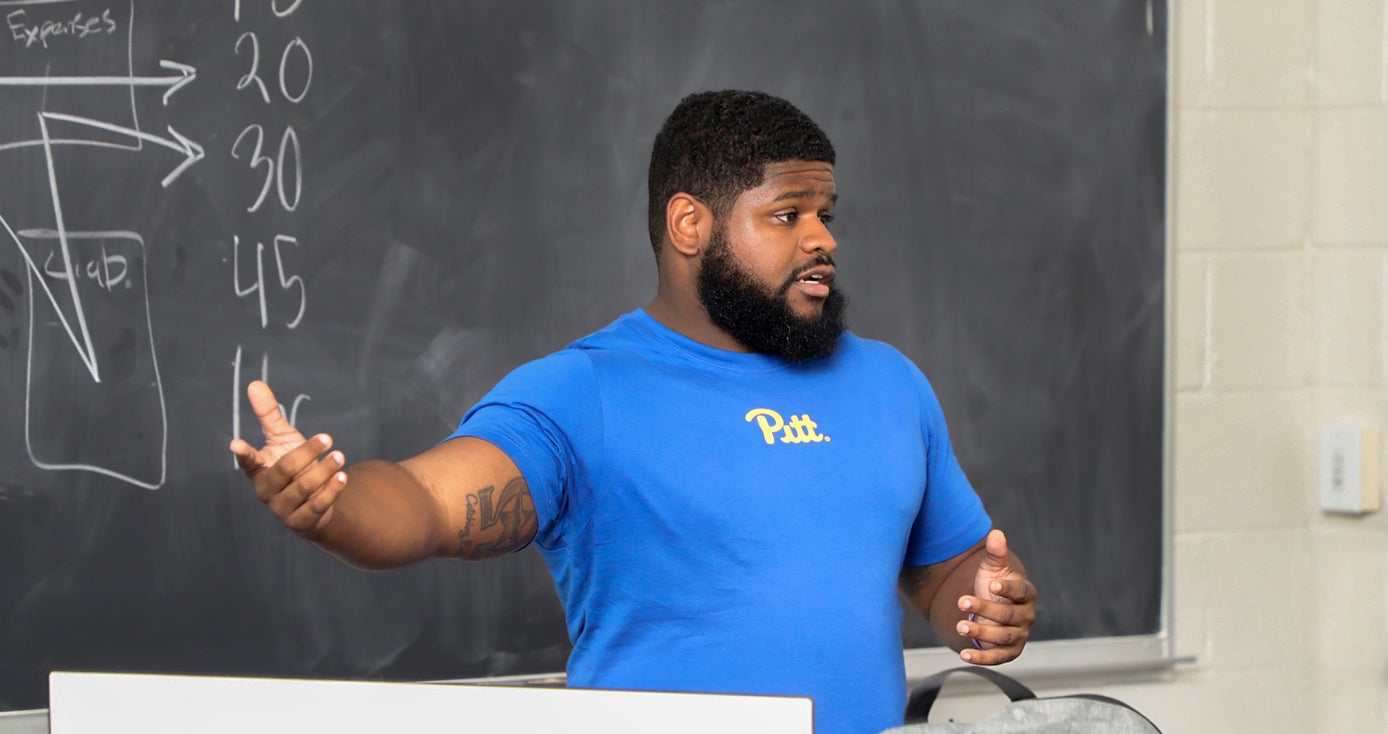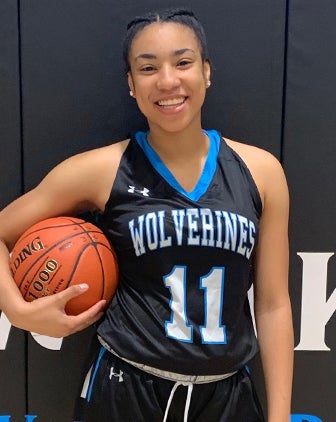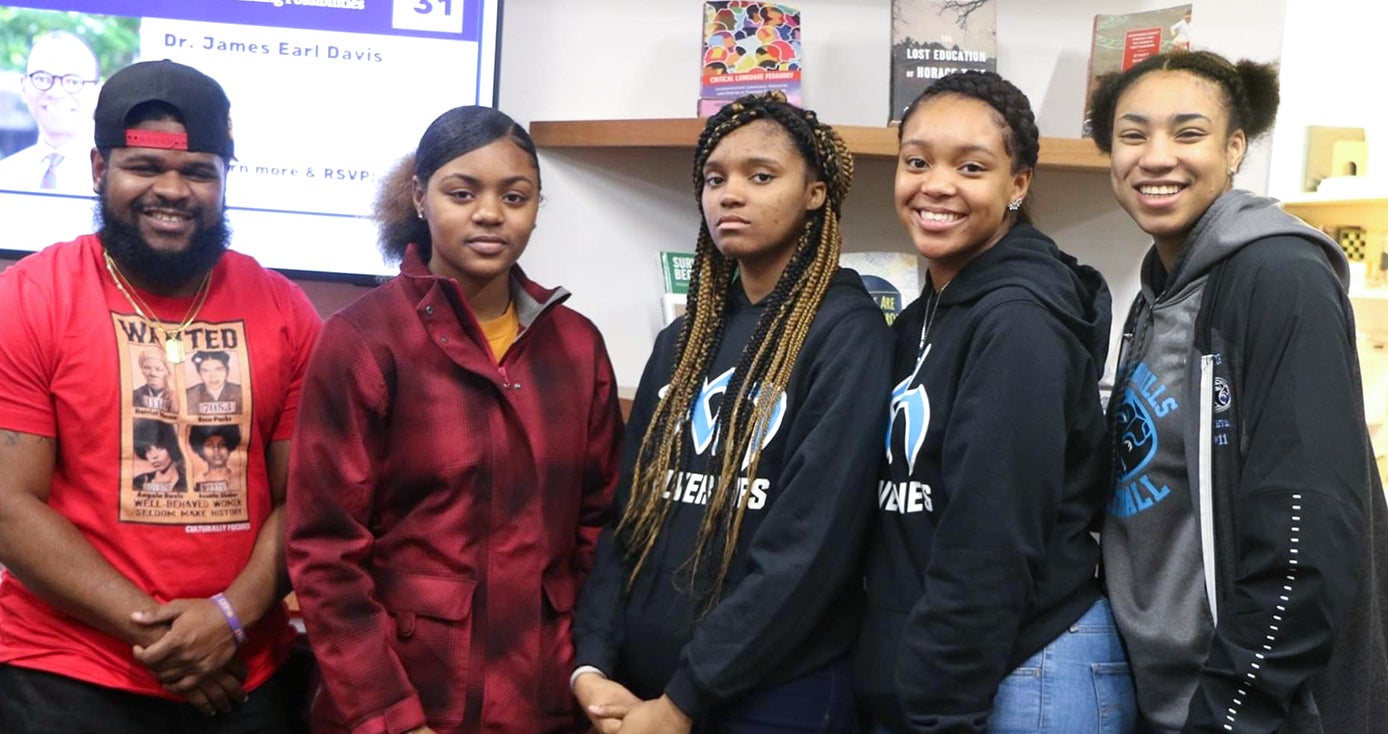
Subscribe to Pittwire Today
Get the most interesting and important stories from the University of Pittsburgh.Heinz Fellows Stay Connected with Mentees to Finish School Year
Joi Burleigh, a senior at Woodland Hills High School, is set to head off to college in the fall on a basketball scholarship. Before the COVID-19 crisis temporarily closed down her school, she suffered a particularly hard loss on the court—her last game as a Wolverine.
“When we lost our playoff game, I was a train wreck for a couple of days,” she said. To help get through this emotional time, she sought advice from her mentor, Christopher Darby.
“I sat down in Chris’ office, and he helped me through it. He told me that I’m lucky because I get to play basketball in college; I have something to look forward to,” she said. “He got me over the hump of being sad.”
Darby is part of the Heinz Fellows Program with the Center for Urban Education (CUE) at the University of Pittsburgh’s School of Education. The program is a yearlong opportunity for college graduates interested in urban education to serve as role models and mentors to elementary, middle and high school students in the Pittsburgh area, and there are 14 students in this year’s cohort.
Before the crisis, Darby spent four to five days a week at Woodland Hills High School in the eastern suburbs of Pittsburgh, where he built a rapport with students outside the classroom.
“I did my best to create a space for students to come and relax—almost like a study hall space. It had puzzles, chessboards, things like that. But we also had conversations that allowed the students to open up about things going on in their lives, both in and out of school,” said Darby, who said his mentorship initially started with student-athletes, but soon word spread to more students.
“People started saying to their friends, ‘Mr. Chris is cool, stop by his space,’ and the word kind of grew,” he said. “We were moving along pretty well, and then the COVID-19 crisis hit, and we hit a wall.”
‘Consistency yields results’
When Woodland Hills transitioned to a virtual model, Darby knew it was important to stay connected with his mentees. He said that he continues to check in with them via FaceTime and text message throughout the week.
“A lot of these students go through the school year without consistency. People come in and out of their lives,” he said. “I wouldn’t be doing my job if I just gave up on the students right now that the school is closed. These are times where students need someone who cares for them—to help guide them through the chaos. Because consistency yields results.”
For students like Burleigh who are preparing for college, Darby has been a source of support, providing virtual help in areas like in filling out FAFSA forms and researching if their institution is waiving SAT scores for the fall semester.
Burleigh said Darby gave her guidance in writing her college essay and putting together her resume. While she said she’s still deciding where she’ll attend school in the fall, Burleigh said Darby gave her insight on what to look for in a college. During the crisis, she said he’s also given her ideas of how to keep busy and keep her mind active.
“The biggest piece of advice he gave me was to be selfish,” said Burleigh. “I’m the kind of person who gives my all to everyone, but he told me I need to look out for myself.”
He’s also encouraging the students to be their own advocates—a life skill they can carry with them long after the pandemic is over.
“I won’t make all the phone calls to admissions offices for them, but I’m teaching them to advocate for themselves to make those phone calls through proper channels,” said Darby, who is also pursuing a doctorate in education (EdD) at Pitt, with a concentration in urban education. “I’ll say, ‘I can find this number for you, and we can call them on three-way together.’”
Phillip Woods, high school principal of Woodland Hills School District, compared Darby’s role to that of an academic coach.
“Chris is helping to motivate the students to stay engaged and focused on their future dreams and aspirations. He’s like an academic coach, keeping the kids focused on the ultimate goal,” said Woods.
Woods initiated a fundraising campaign to provide laptops for Woodland Hills High School students who were in need of the technology necessary to stay on track and finish the school year from home. Darby jumped in immediately to help, and CUE also jumped in by donating 10 laptops to the school.
“Christopher contacted me and said some of his mentees were in need of laptops but didn’t have access to the school to come pick them up,” said Woods. “He helped bridge the gap for those students and delivered them himself. He’s doing a phenomenal job.”
Staying committed
“CUE is actively responding to the schooling and educational realities created by the pandemic,” said T. Elon Dancy II, director of CUE. “We are deeply proud of our Heinz Fellows who, even in this challenging moment, continue to demonstrate the kinds of attention and care that we know supports student learning.”
Darby’s peers in the program have continued to stay connected to their respective mentees in the Pittsburgh Public Schools (PPS), including students at Manchester Academic Charter School, Miller African Centered Academy, Pittsburgh Weil and University Prep.
Sophia Bender, a Heinz Fellow who mentors University Prep students in grades 6-8, said she’s also been in touch with her students’ parents—sharing resources about Centers for Disease Control and Prevention guidelines and answering questions about PPS’s transition to remote learning.
“A lot of parents say they’re appreciative to hear from me. It’s nice for them to know there’s someone else involved in their child’s life,” said Bender.
Another fellow, Victoria Bleiweiss, said she too is maintaining contact and sharing resources with her mentees’ families through phone calls and texts. She’s also making food and resource deliveries to families in the Hill District.
“I’m using this time to support my mentees and Pittsburgh Weil however possible. I’ve also regularly checked in with teachers, liaisons and school administrators to see how we can support,” Bleiweiss said.
As the pandemic continues, Darby and his peers recognize their roles as Heinz Fellows need to withstand the crisis, because their mentees’ futures depend on it.
“A lot of times, no one at home is forcing these students to do their schoolwork now that they’re in remote learning,” said Darby, “We need to motivate them to finish.”
CUE-Compiled Resources
In response to the pandemic, the Center for Urban Education compiled a resource website for students, faculty, staff and the community to support the transition to remote teaching, learning and working, and to encourage wellness and well-being.




